- Home
- Sue Grafton
N is for NOOSE Page 4
N is for NOOSE Read online
Page 4
“All right. I might like to have one myself. That’s nice of him.”
“He didn’t smile much?”
“Not often. Especially in social situations. Around his buddies, he relaxed… the other deputies. How’s it coming.
I shrugged. “So far there’s nothing but junk.” I went back to the masses of paper in front of me. “Too bad you weren’t in charge of the bills,” I remarked.
“I’m not good with numbers. I hated high school math,” she said. And then after a moment, “I’m beginning to feel guilty having you snoop through his things.”
“Don’t worry about it. I do this for a living. I’m a diagnostician, like a gynecologist when you have your feet in the stirrups and your fanny in the air. My interest isn’t personal. I simply look to see what’s there.”
“He was a good man. I know that.”
“I’m sure he was,” I said. “This may net us nothing and if so, you’ll feel better. You’re entitled to peace.”
“Do you need help?”
“Not really. At this point, I’m still picking my way through. Anyway, I’m about to wrap it up for this afternoon. I’ll come back tomorrow and take another run at it.” I jammed a fistful of catalogs and advertising fliers in the trash bag. I glanced up again, aware that she was still standing in the door.
“Could you join me for supper? Brant’s going to be working so it would just be the two of us.”
“I better not, but thanks. Maybe tomorrow. I have some phone calls to make and then I thought I’d grab a quick bite and make an early night of it. I should finish this in the morning. At some point, we’ll have telephone records to go through. That’s a big undertaking and I’m saving it for last. We’ll sit side by side and see how many phone numbers you can recognize.”
“Well,” she said, reluctantly, “I’ll let you get back to work.”
When I had finished for the day, Selma gave me a house key, though she assured me she generally left the doors unlocked. She told me she was often gone, but she wanted me to have the run of the place in her absence. I told her I’d want to look through Tom’s personal effects and she had no objections. I didn’t want her walking in one day to find me poking through his clothes.
It was fully dark when I left and the streetlights did little to dispel the sense of isolation. The traffic through town was lively. People were going home to dinner, businesses were shutting down. Restaurants were getting busy, the bar doors standing open to release the excess noise and cigarette smoke. A few hardy joggers had hit the sidewalks along with assorted dog owners whose charges were seeking relief against the shrubs.
Once I was out on the highway, I became aware of the vast tracts of land that bore no evidence of human habitation. By day, the fences and the odd outbuildings created the impression the countryside had been civilized. At night, the mountain ranges were as black as jet and the pate slice of moon scarcely brushed the snowy peaks with silver. The temperature had dropped and I could smell the inky damp of the lake. I felt a flicker of longing to see Santa Teresa with its red-tile roofs, palm trees, and the thundering Pacific.
I slowed when I saw the sign for Nota Lake Cabins. Maybe a crackling fire and a hot shower would cheer me up. I parked my car in the small lot near the motel office. Cecilia Boden had provided a few low-voltage lights along the path to the cabins, small mushroom shapes that cast a circle of dim yellow on the cedar chips. There was a small lighted lamp mounted by the cabin door. I hadn’t left any lights on for myself, sensing (perhaps) that the management would frown on such extravagance. I unlocked the door and let myself in, feeling for the light switch. The overhead bulb came on with its flat forty-watt wash of light. I crossed to the bed and clicked on the table lamp, which offered forty watts more. The digital alarm was flashing 12:00 repeatedly, which suggested a minor power outage earlier. I checked my watch and corrected the time to its current state: 6:22.
The room felt drab and chilly. There was a strong smell of old wood fires and moisture seeping through the floorboards from underneath the cabin. I checked the wood in the grate. There was a stack of newspapers close by meant for kindling. Of course, there was no gas starter and I suspected the fire would take more time to light than I had time to enjoy. I went around the:, room, closing cotton curtains across the windowpanes. Then I peeled off my clothes and stepped into the. shower. I’m not one to waste water, but even so, the hot began to diminish before my four minutes were up. I rinsed the last of the shampoo from my hair a split second before the cold water descended full force. This was beginning to feel like a wilderness experience.
Dressed again, I locked the cabin and headed back toward the road, walking briskly along the berm until I reached the restaurant. The Rainbow Cafe was about the size of a double-wide trailer, with a Formica counter with eight stools running down its length and eight red Naugahyde booths arranged along two walls. There was one waitperson (female), one shortorder cook (also female), and a boy busperson in evidence. I ordered breakfast for dinner. There’s nothing so comforting as scrambled eggs at night; soft cheery yellow, bright with butter, flecked with pepper. I had three strips of crisp bacon, a pile of hash browns saut��ed with onion, and two pieces of rye toast, drenched in butter and dripping with jam. I nearly crooned aloud as the flavors blended in my mouth.
On the way back to my cabin, I paused to use the pay phone outside the office. This consisted of an oldfashioned glass-and-metal phone booth missing the, original bifold door. I used my credit card to call Dietz. “Hey, babe. How’s the patient?” I said when he answered.
“Dandy. How are you?”
“Not bad. Now on retainer.”
“In Nota Lake?”
“Where else? Standing in a phone booth in the piney woods,” I said.
“How’s it going?”
“I’m just getting started so it’s hard to tell. I’m assuming Selma talked to you about Tom.”
“Only that she thought he had something on his mind. Sounds vague.”
“Extremely. Did you ever meet him yourself?”
“Nope. In fact, I haven’t even seen her for over fifteen years. How’s she holding up?”
“She’s in good shape. Upset, as who wouldn’t be in her shoes.”
“What’s the game plan?” he asked.
“The usual. I spent time today going through his desk. Tomorrow I’ll start talking to his friends and acquaintances and we’ll see what develops. I’ll give it until Thursday and then see where we stand. I’d love to be home by the weekend if this job doesn’t pan out. How’s the knee?”
“Much better. The PT’s a bitch, but I’m getting used to it. I miss your sandwiches.”
“Liar.”
“No, I’m serious. As soon as you finish there, I think you ought to head back in this direction.”
“Uh-unh. No thanks. I want to sleep in my own bed. I haven’t seen Henry for a month.” Henry Pitts was my landlord, eighty-six years old. His would be the cover photo if the AARP ever did a calendar of octogenarian hunks.
“Well, think on it,” Dietz said.
“Oh, right. Listen, my Florence Nightingale days are over. I have a business to run. Anyway, I better go. It’s friggin’ cold out here.”
“I’ll let you go then. Take care.”
“Same to you,” I said.
I put a call through to Henry and caught him on his way out the door. “Where you off to?” I asked.
“I’m on my way to Rosie’s. She and William need help with the dinner crowd tonight,” he said. Rosie ran, the tavern half a block from my apartment. She and Henry’s older brother William had been married the previous Thanksgiving and now William was rapidly becoming a restaurateur.
“What about you? Where’re you calling from?”
I repeated my tale, filling him in on my current situation. I gave him both Selma’s home number and that of the office at the Nota Lake Cabins in case he had to reach me. We continued to chat briefly before he had to go. Once he rang off,
I placed a call to Lonnie’s office and left a message for Ida Ruth, again giving her my location and Selma’s number if she should have to reach me for some reason. I couldn’t think of any other way to feel connected. After I hung up, I stuck my hands in my jacket pockets, vainly hoping for shelter from the wind. The notion of spending the evening in the cabin seemed depressing. With only two forty-watt light bulbs for illumination, even reading would be a chore. I pictured myself huddled, squinting, under that damplooking quilt, spiders creeping from the wood pile the minute I relaxed my vigilance. It was a sorry prospect, given that all I had with me was a book on identifying tire tracks and tread marks.
I crossed to the motel office and peered in through the glass door. A light was on, but there was no sign of Cecilia. A hand-lettered sign said RING FOR MGR. I let myself in. I bypassed the desk bell and knocked on the door marked MANAGER After a moment, Cecilia appeared in a pink chenille bathrobe and fluffy pink slippers. “Yes?”
“Hi, Cecilia. Could I have a word with you?”
“Something wrong with the room?”
“Not at all. Everything’s fine. More or less. I was wondering if you could spare a few minutes to talk about your brother.”
“What about him?”
“Has Selma said anything about why I’m here in Nota Lake?”
“Said she hired you is all. I don’t even know what you do for a living.”
“Ah. Well, actually, I’m a field investigator with California Fidelity Insurance. Selma’s concerned about the liability in Tom’s death.”
“Liability for what?”
“Good question. Of course, I’m not at liberty to discuss this in any detail. You know, officially he wasn’t working, but she thinks he might have been pursuing departmental business the night he died. If so, it’s always possible she can file a claim.” I didn’t mention that Tom Newquist wasn’t represented by CFI or that the company had fired me approximately eighteen months before. I was prepared to flash the laminated picture ID I still had in my possession. The CH logo was emblazoned on the front, along with a photograph of me that looked like something the border patrol might keep posted for ready reference. She stared at me blankly and for one heart-stopping moment I wondered if she was recently retired from some obscure branch of county government. She appeared to be mulling over all the rules and regulations, trying to decide which were in effect on the night in question. I was tempted to embellish, but decided I might be getting in too deep. With lies, it’s best to skip across the surface like a dragonfly. The more said at the outset, the more there is to retract later if it turns out you really put your foot in it. She held the door open to admit me. “You better come on in. I don’t mind telling you the subject’s painful.”
“I can imagine it is and I’m sorry to intrude. I met Macon earlier.”
“He’s useless,” she remarked. “No love lost between us. Of course, I never thought of Selma as family either and I’m sure it’s ditto from her perspective.”
Cecilia Boden’s apartment was on a par with my cabin, which is to say, drab, poorly lighted, and faintly shabby. The prime difference was that my place was icy cold where she seemed to keep her room temperature somewhere around “pre-heat.” The floor cover was linoleum made to look like wood parquet. She had pine-paneled walls, overstuffed furniture covered with violent-colored crocheted throws. A large television set, dominated one corner, with all the furniture oriented in that direction. Cecilia’s reading glasses were perched on the arm of the sofa nearest the set. I could see that she was in the process of filling out the crossword puzzle in the local paper. She did this in ballpoint pen without any visible corrections. I revised my estimate of her upwards. I couldn’t perform such a feat with a gun to my head.
We took a few minutes to get settled in the living room. While my story sounded plausible, it didn’t give me much room to inquire into Tom’s character. In any event, why would I imagine Cecilia would have information about what he was doing the night he died? As it turned out, she didn’t question my purpose and the longer we chatted, the clearer it became that she was perfectly comfortable discussing Tom and his wife, their marriage, and anything else I cared to ask about.
“Selma says Tom was preoccupied with something in the past few weeks. Do you have any idea what it might have been?”
Cecilia narrowed her eyes at the section of floor she was studying.
“What makes her think there was anything wrong with him?”
“Well, I’m not sure. She said he seemed tense, smoking more than usual, and she thought he was losing weight. She said he slept poorly and disappeared without explanation. I take it this wasn’t typical. Did he say anything to you?”
“He didn’t confide anything specific,” she said, cautiously. “You’ll have to talk to Macon about that. They were a lot closer to each other than either one of them was to me.”
“But what was your impression? Did you feel he was under some kind of strain?”
“Possibly.”
Too bad I wasn’t taking notes, what with the wealth of data pouring out. “Did you ever ask him about it?”
“I didn’t feel it was my place. That wasn’t the nature of our relationship. He went about his business and I went about mine.
“Any hunches about what was going on?”
She hesitated for a moment. “I think Tom was unhappy. He never said as much to me, but that’s my belief.”
I made a sort of mmm sound, verbal filler accompanied by what I hoped was a sympathetic look.
She took this for encouragement and launched into her analysis. “Far be it from me to criticize Selma. He married her. I didn’t. It’s possible there was more to her than meets the eye. We’d certainly have to hope so. If you want my opinion, my brother could have done a lot better for himself. Selma’s a snob, if you want to know the truth.”
This time I murmured, “Really.”
Her gaze brushed my face and then drifted off again. “You look like a good judge of character, so I don’t feel I’m telling tales out of school when I say this. She has no spiritual foundation even if she does go to church. She’s a mite materialistic. She seems to think she can use acquisitions to fill the void in her life, but it won’t do.”
“For example,” I said.
“You saw the new carpet in the living room?”
“Yes, I saw that.”
Cecilia shot me a glance filled with satisfaction. “She had that installed about ten days ago. I thought it was in poor taste, doing it so soon, but Selma never asked me. Selma’s also confided she’s considering having those two front teeth capped, which is not only vain, but completely trivial. Talk about a waste of money. I guess now she’s a widder, she can do anything she likes.”
What I thought was, what’s wrong with vanity? Given the range of human failings, self-absorption is harmless compared to some I could name. Why not do whatever you deem relevant to feeling better about yourself ��� within reason, of course. If Selma wanted to get her teeth capped, why should Cecilia give a shit? What I said was, “I got the impression she was devoted to Tom.”
“As well she should have been. And he to her, I might add. Tom spent his life trying to satisfy the woman. If it wasn’t one thing, it was another. First, she had to have a house. Then she wanted something bigger in a better neighborhood. Then they had to join the country club. And on and on it went. Anytime she didn’t get what she wanted? Well, she pouted and sulked until he broke down and got it for her. It was pitiful in my opinion. Tom did everything he could, but there wasn’t any way to make her happy.”
I said, “My goodness.” This is the way I talk in situations like this. I could not, for the life of me, think where to go from here. “He was a nice-looking man. I saw a picture of him at the house,” I said, vamping.
“He was downright handsome. Why he married Selma was a mystery to me. And that son of hers?” Cecilia pulled her lips together like a drawstring purse. “Brant was a pain in the grits from the fir
st time I ever laid eyes on the boy. He had a mouth on him like a trucker and he was bratty to boot. Back talk and sass? You never heard the like. Did poorly in school, too. Problems with his temper and what they call his impulse control. Of course, Selma thought he was a saint. She . wouldn’t tolerate a word of criticism regardless of what’ he did. Poor Tom nearly tore his hair out. I guess he finally managed to get the boy squared away, but it was no thanks to her.”
“She mentioned Brant worked as a paramedic. That’s a responsible job.”
“Well, that’s true enough,” she conceded grudgingly. “About time he took hold. You can credit Tom for that. “
“Do you happen to know where Tom was going that night? I understand he was found somewhere on the outskirts of town.”
“A mile north of here.”
“He didn’t drop in to see you?”
“I wish he had,” she said. “I was visiting a friend down in Independence and didn’t get back here until shortly after ten fifteen or so. I saw the ambulance pass, but I had no idea it was meant for him.”
Chapter 4
*
Tuesday morning at nine, I stopped by the offices of the Nota County Coroner. I hadn’t slept well the night before. The cabin was poorly insulated and the night air was frigid. I’d moved the thermostat up to 70, but all it did was click off and on ineffectually. I’d crawled into bed wearing my sweats, a turtleneck, and a pair of heavy socks. The mattress was as turgid as a trough of mud. I curled up under a comforter, a quilt, and a wool blanket, with my heavy leather jacket piled on top for the weight. just about the time I got warm, my bladder announced that it was filled to capacity and required my immediate attention or a bout of bedwetting would ensue. I tried to ignore the discomfort and then realized I’d never sleep a wink until I’d heeded the message. By the time I got back under the covers, all the ambient heat had been dispelled and I was forced to suffer through the cold again until I drifted off to sleep.

 S Is for Silence
S Is for Silence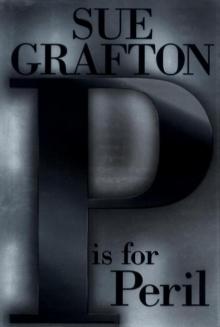 P Is for Peril
P Is for Peril R Is for Ricochet
R Is for Ricochet J Is for Judgment
J Is for Judgment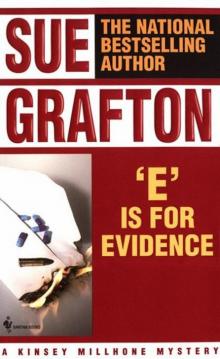 E Is for Evidence
E Is for Evidence T Is for Trespass
T Is for Trespass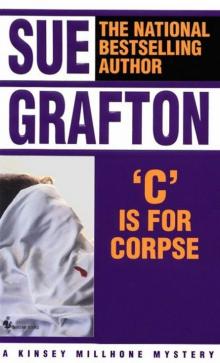 C Is for Corpse
C Is for Corpse U Is for Undertow
U Is for Undertow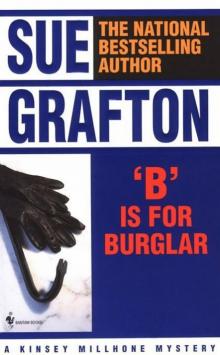 B Is for Burglar
B Is for Burglar Four Sue Grafton Novels
Four Sue Grafton Novels D Is for Deadbeat
D Is for Deadbeat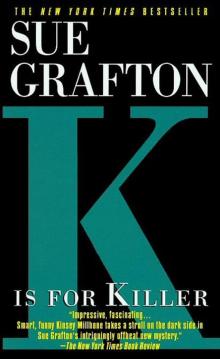 K Is for Killer
K Is for Killer I Is for Innocent
I Is for Innocent A Is for Alibi
A Is for Alibi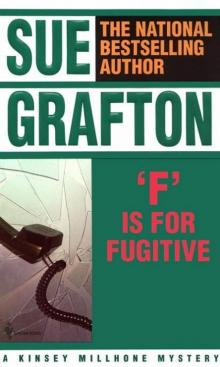 F Is for Fugitive
F Is for Fugitive Q Is for Quarry
Q Is for Quarry W Is for Wasted
W Is for Wasted Kinsey and Me: Stories
Kinsey and Me: Stories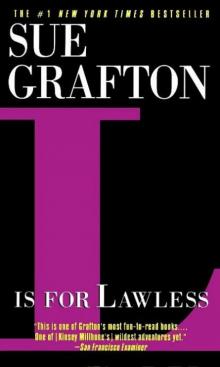 L Is for Lawless
L Is for Lawless Y Is for Yesterday
Y Is for Yesterday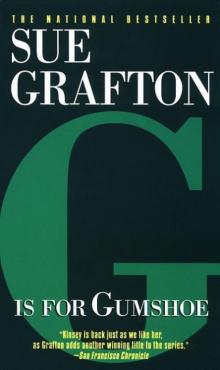 G Is for Gumshoe
G Is for Gumshoe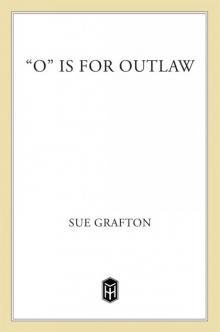 O Is for Outlaw
O Is for Outlaw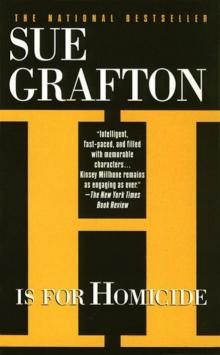 H Is for Homicide
H Is for Homicide X
X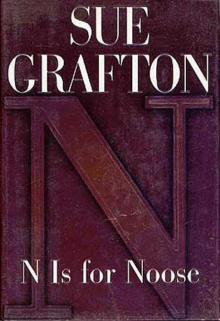 N Is for Noose
N Is for Noose Three Complete Novels: A Is for Alibi / B Is for Burglar / C Is for Corpse
Three Complete Novels: A Is for Alibi / B Is for Burglar / C Is for Corpse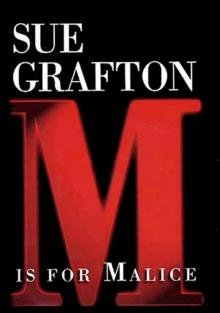 M Is for Malice
M Is for Malice I is for INNOCENT
I is for INNOCENT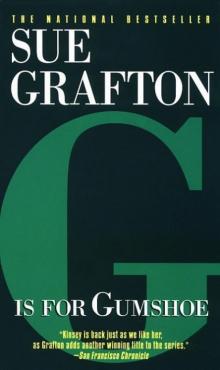 G is for GUMSHOE
G is for GUMSHOE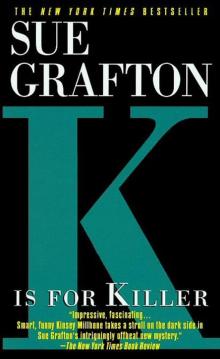 K is for KILLER
K is for KILLER S is for SILENCE
S is for SILENCE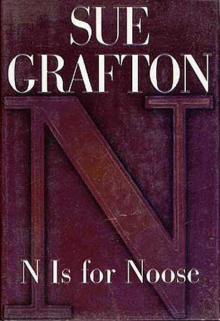 N is for NOOSE
N is for NOOSE D is for DEADBEAT
D is for DEADBEAT V is for Vengeance
V is for Vengeance U is for Undertow
U is for Undertow W Is for Wasted km-23
W Is for Wasted km-23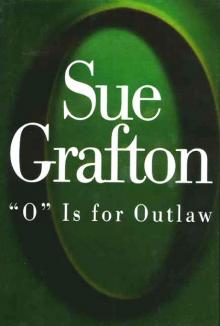 O is for OUTLAW
O is for OUTLAW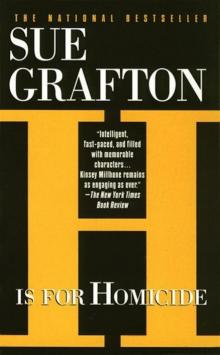 H is for HOMICIDE
H is for HOMICIDE Sue Grafton Novel Collection
Sue Grafton Novel Collection Kinsey and Me
Kinsey and Me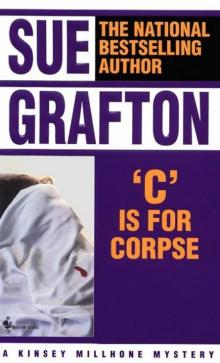 C is for CORPSE
C is for CORPSE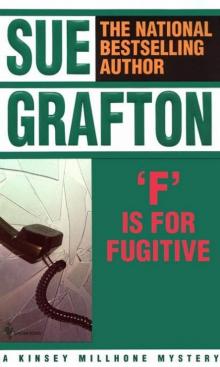 F is for FUGITIVE
F is for FUGITIVE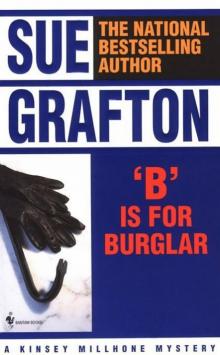 B is for BURGLAR
B is for BURGLAR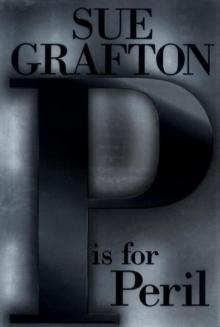 P is for PERIL
P is for PERIL A is for ALIBI
A is for ALIBI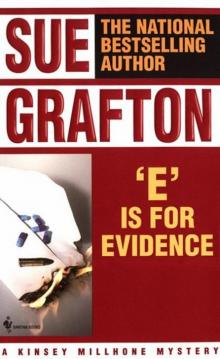 E is for EVIDENCE
E is for EVIDENCE J is for JUDGMENT
J is for JUDGMENT Q is for QUARRY
Q is for QUARRY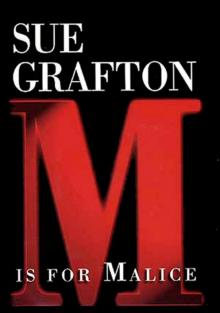 M is for MALICE
M is for MALICE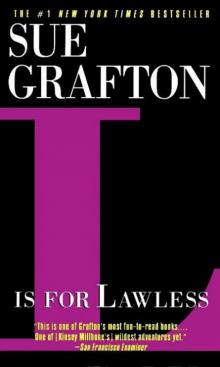 L is for LAWLESS
L is for LAWLESS